How Many People in Sweden Speak English?
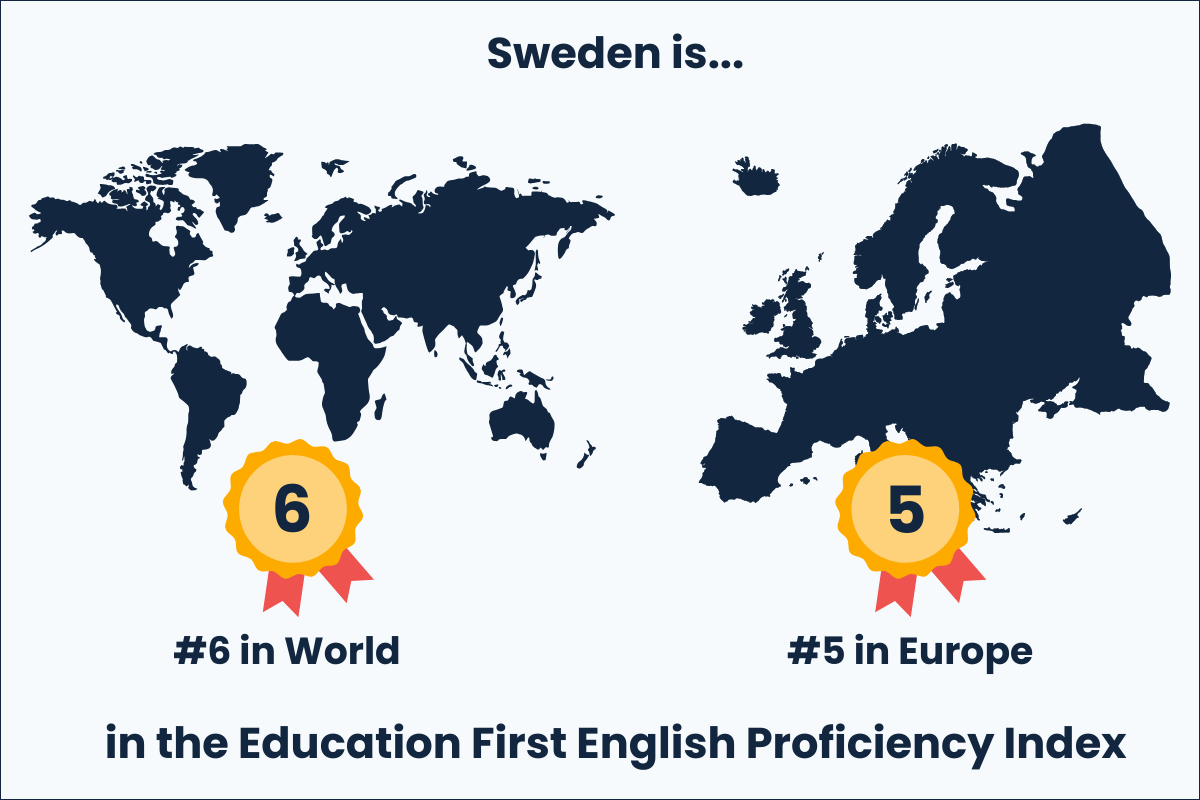
Scandinavian countries are renowned for their impressive English skills and Sweden is no exception. Despite its relatively small population, Sweden has a very high proportion of people who speak English as a second language. Almost 9 in 10 people in Sweden speak English, and the average Swede has a very good command of the language.
English is a second language in Sweden for 9,236,000 people or 89% of the country’s population. These figures make Sweden #7 in the E.U. and #27 worldwide for its non-native English speakers by total numbers. Percentage-wise, within the European Union, Sweden is second only to The Netherlands, where 90.9% of people speak English.
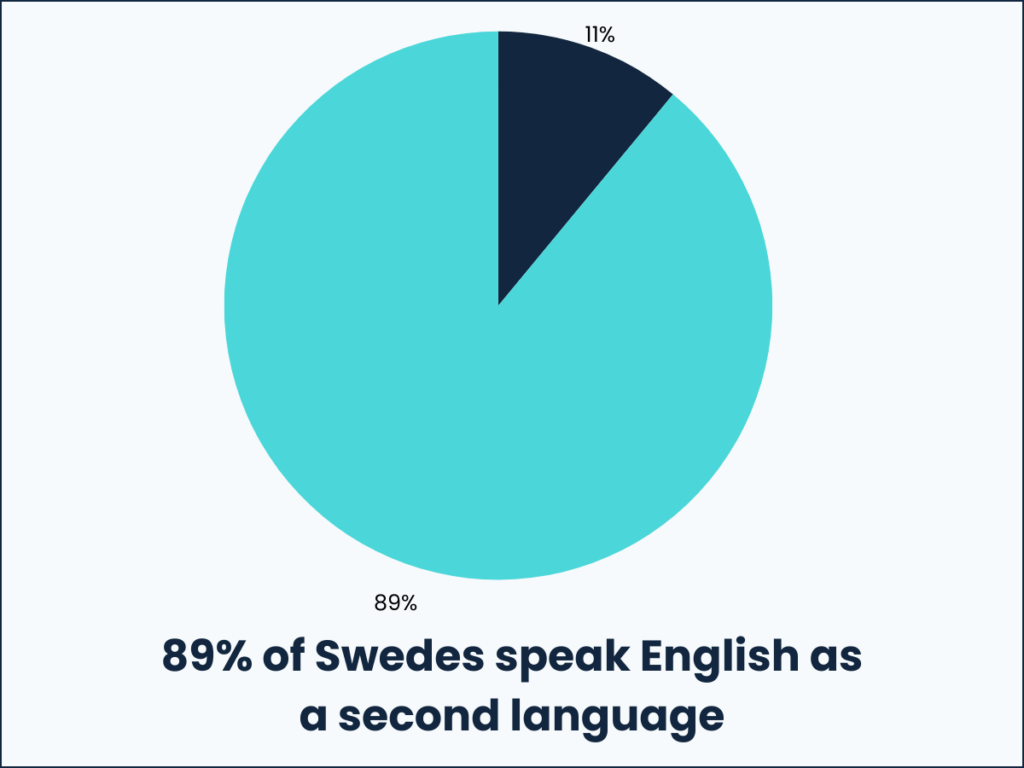
Keep reading to discover more interesting and in-depth stats about English in Sweden!
English Speakers in Sweden (General Stats)
By any metric observed, Sweden is among the best English-speaking countries in the world. Here’s an overview of what we know about English in Sweden:
- 9,236,000 people, or 89% of people in Sweden speak English as a second language.
- By total numbers, Sweden is #27 in the world, #9 in Europe, and #8 in the E.U.
- By percentages, Sweden is #8 in the world, #3 in Europe, and #2 in the E.U.
- According to the 2023 EPI data, Sweden has very high English skills on average.
- Sweden is 6th in the world and 5th in Europe by English proficiency in 2023.
- South Sweden has the best English on average, scoring 8-26 points higher on the EPI scale compared to other Swedish regions.
- Göteborg is #1 at speaking English, according to the same EPI data from 2023.
- Swedish children take mandatory English classes starting at a very early age.
- Swedish people aged 26-30 have the highest English proficiency statistically.
- English is widely spoken in Sweden’s multinational companies, tourist areas, and even on some of Sweden’s radio and TV stations.
According to these numbers, it’s safe to assume the average Swedish person over the age of 20 speaks English at an advanced level, or the equivalent of a C1 on the CEFR scale. What this means in real-world terms is that most Swedish people can:
- Understand standard English spoken at a regular native speed (e.g., movies and TV programs in English)
- Read at an academic level, distinguishing implied meaning and understanding long and complex texts, including specialized articles
- Speak fluently and spontaneously, using the English language in a flexible and precise way to easily make themselves understood in everyday as well as professional settings
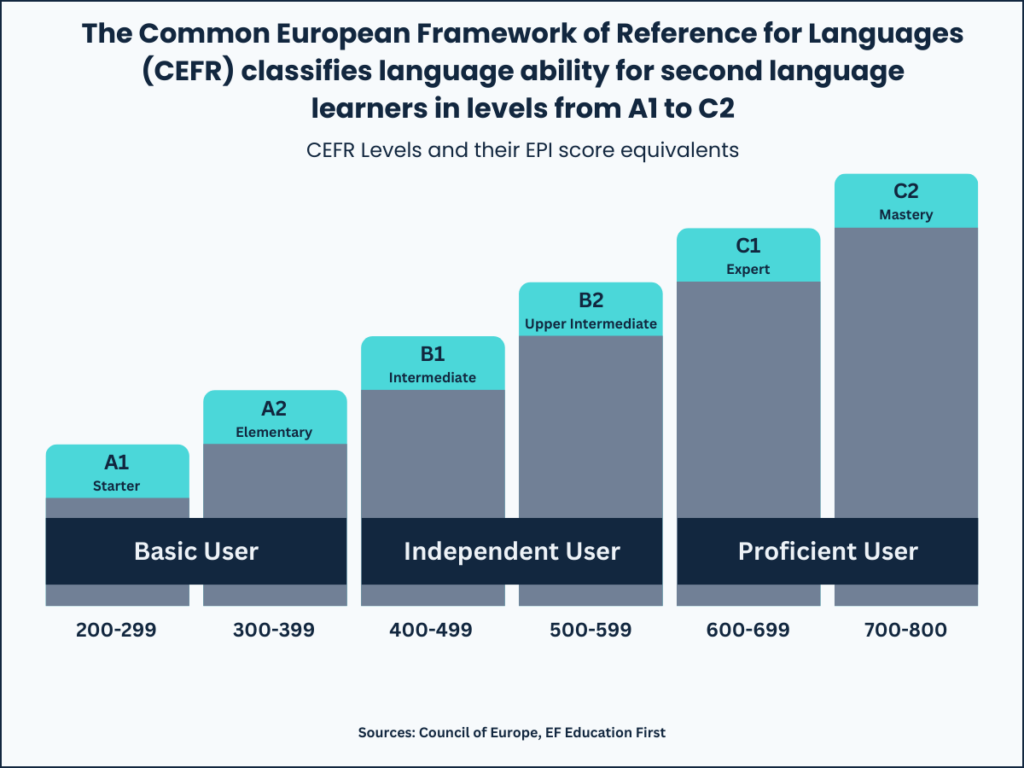
This widespread level of very high English fluency is no small feat. Naturally, many people are quick to wonder what makes the Swedes speak English so well.
No article on the topic is complete without touching on this subject. So, let’s take a closer look at this question…
Why Are Swedish People So Good at Speaking English?
In short, Sweden’s impressive language proficiency is the result of early second-language education and constant exposure to foreign-language media.
For a more detailed explanation, Sweden’s English proficiency is the result of multiple social, cultural, and economic factors:
Swedish children start English classes early and study more
English is a compulsory subject in the Swedish curriculum, with students starting English classes at a young age.
English classes begin in primary school, in grades 1-4, roughly at the age of 6. English remains part of the curriculum throughout compulsory education, until the end of grade 9. Besides introducing English classes at a young age, the Swedish education system also allocates a considerable number of hours.
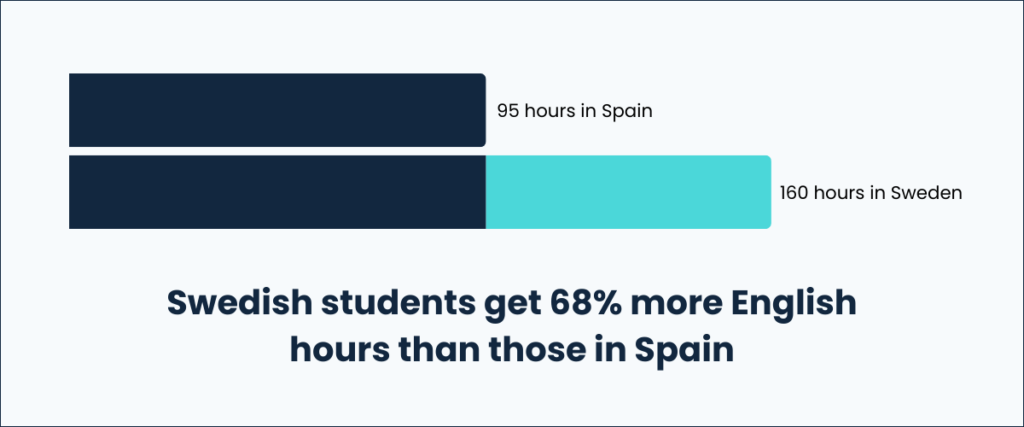
For each three years of school, the Swedish curriculum requires a minimum of 480 hours for English, averaging 160 hours yearly. By the end of compulsory school, each Swedish student will have received a minimum of 1,440 hours of English language instruction.
According to the CEFR, it takes roughly 1,000-1,200 hours of study to reach a proficient (C2) level when learning English as a foreign language. As we can see, the Swedish curriculum is structured to provide the optimal number of hours to help students master the English language.
Sweden invests considerably more time into English education compared to other countries. In fact, English learners in Sweden receive 68% more hours of instruction than those in Spain for each year of compulsory education. While Swedish learners get an average of 160 hours per year, those in Spain might get just 95 hours on average.
The Swedish language is quite similar to English
Learning any language takes time and effort but getting a head start always helps. People who speak Swedish as their native language are at an advantage because English and Swedish closely related.
For starters, English and Swedish are both of Germanic origin. Swedish is a North Germanic language, while English is a West Germanic language. Secondly, English has been shaped by Old Scandinavian languages, particularly Old Norse, throughout its history.
After nearly three centuries of Old Norse influence during the Viking settlement in Britain, much of Old English vocabulary and grammar underwent marked changes, which we can still see today.
While the two languages are not mutually intelligible, Modern English and Swedish have multiple similarities due to their close origins and histories. The two languages share a lot of their common vocabulary. Not only that, but both languages are also quite similar in terms of basic grammar.
Let’s compare some basic Swedish words and phrases to get a better idea of what this means:
| Swedish | English |
| God/gott | Good |
| Bäst | Best |
| God morgon! | Good morning! |
| Tack! | Thanks! |
| Jag är hungrig. | I am hungry. |
| Jag har en ny bok. | I have a new book. |
| Is that a school? | Är det en skola? |
| Jag såg en katt. | I saw a cat. |
| Kan du se ett rött hus? | Can you see a red house? |
| Min familj kommer nästa fredag. | My family is coming next Friday. |
Many other common Swedish words look and sound similar to their English counterparts. On top of that, modern Swedish has also adopted a lot of new English loanwords as well (e.g.: Buss, Hotell, Kaffe, Internet, Jeans, etc.)
It’s easy to see how Swedes picking up English would have an easier start with the basics. The similarities between Swedish and English help new learners reach an elementary or intermediate level quicker and more easily compared to people who speak other languages.
Sweden is a small country with a big international impact
Sweden is the 12th country in the E.U. by population but has a massive international impact. Sweden has been topping the European Innovation Score charts year after year, establishing itself as a leader in innovation in multiple industries.
Whether we’re talking about the automotive, robotics, IT, pharmaceutical, or financial branches, Sweden is the birthplace of many big names, including Volvo, ABB Robotics, Klarna, Ericsson, and AstraZeneca, to list a few.
Given Sweden’s active role on the international stage, good business communication is always a top priority. In this context, a multilingual workforce is an asset for any Swedish employer. English, in particular, is always in high demand in big Swedish companies, given its role as the primary language of business.
English-language media is big in Sweden
Immersion is touted as one of the best ways of learning a foreign language. What this means is that learners need constant exposure to the new language. At the end of the day, practice makes perfect! And Swedes have plenty of opportunities to practice their English every day.
English-language media is very popular in Sweden, as everywhere else on the planet. The U.S. and U.K. dominate the world in terms of T.V. shows and movie exports.
But unlike in other countries, the main method of translation in Sweden is subtitling, rather than dubbing. As a result, Swedes get to watch movies and shows in English with Swedish subtitles, being exposed to the spoken language daily.
Listening to music is also a common pastime everywhere in the world, including Sweden. Even the most popular bands and artists in Sweden put out English music. Names like ABBA, Roxette, Avicii, Zara Larsson, Tove Lo, Lykke Li, and Sabaton are just some examples.
Sources: Education First, Wikipedia, Government Offices of Sweden, Council of Europe, European Commission, Cambridge, Statista
English Speakers in Sweden by Region
Regions By Number of English Speakers
Almost 90% of people in Sweden speak English so the average person living anywhere in the country is likely to know the language. By total numbers, these are the regions with the most English-speaking people:
- Stockholm
- Västra Götaland
- Skåne
Those three are the largest regions in Sweden, as well as the biggest contributors to the Swedish economy. According to a 2021 OECD report, almost 60% of Sweden’s GDP comes from those three regions combined.
Being the counties with the largest industries and populations, it’s very likely that Stockholm, Västra Götaland, and Skåne have the largest share of people speaking English, including locals, tourists, and immigrants.
Regions By English Proficiency
The average English proficiency level of most Swedish regions is very high, though total scores can vary by up to 26 points between some parts of the country.
The EF-EPI website offers geographical scores for 7 out of 8 of Sweden’s statistical regions. According to the numbers, people in South Sweden have the highest English proficiency, with an average score of 624 out of 800.
On the opposite end, Småland and the islands had the lowest English skills and an average score of 598. The table below includes all the regions analyzed in the 2023 report:
| Region | EPI Score | Proficiency Level | CEFR Level |
| South Sweden | 624 | Very high | C1 |
| North Middle Sweden | 616 | Very high | C1 |
| West Sweden | 613 | Very high | C1 |
| Stockholm | 606 | Very high | C1 |
| Upper Norrland | 605 | Very high | C1 |
| East Middle Sweden | 601 | Very high | C1 |
| Småland and the islands | 598 | High | B2 |
There is currently no English proficiency data for Middle Norrland. It appears that people all over Sweden speak English at a C1 level on average. Småland and the islands is the only exception, with a score just under the cutoff point for very high proficiency.
It’s worth noting that the difference between an upper B2 and a C1 level is not that great in everyday communication. People with a B2 English level can still speak English fluently, with great ease and naturalness. However, people at this level still need work to distinguish subtle nuances and implied meanings in conversation.
Overall, people anywhere in Sweden can hold a fluent conversation on everyday as well as complex or technical topics.
Sources: Statista, OECD, Education First
English Speakers in Sweden by City
Cities By Number of English Speakers
In virtually all Swedish cities, a good proportion of the population speaks English. But by total numbers, the following cities stand out as having the most speakers:
- Stockholm
- Göteborg
- Malmö
- Uppsala
- Västerås
Of the above, Stockholm, Göteborg, and Malmö take the lead as the largest cities in the country.
Stockholm, the capital of Sweden, boasts a population of approximately 1 million and is situated on the east coast in Stockholm County. It serves as Sweden’s primary financial hub and one of the Scandinavian region’s major financial centers.
The city is home to numerous local and multinational corporations, top universities, and cultural institutions, attracting English speakers seeking job and educational opportunities.
Göteborg, Sweden’s second-largest city with around 600,000 residents, is located in Västra Götaland in West Sweden. As the principal port city, it’s renowned for being the birthplace of companies like Volvo and Cellink.
Göteborg also houses prestigious universities and research centers, including Chalmers University of Technology and the University of Gothenburg.
Malmö, Sweden’s third-largest city, has a population of over 350,000 and is located in Skåne county in Southern Sweden. It’s home to Malmö University, the United Nations World Maritime University, and some of Sweden’s largest IT, communication, and media companies.
Given its southernmost location, Malmö maintains close ties to Europe, resulting in multilingualism among locals and a diverse population with a substantial number of English speakers, including British immigrants.
Uppsala and Västerås, with populations under 200,000 each, are situated in East Middle Sweden, approximately 80-100 km from Stockholm.
These cities, ranked fourth and fifth in size, feature impressive local industrial sectors, renowned universities like Uppsala University and Mälardalen University College, and offer rich cultural experiences, making them appealing to tourists and locals from other regions.
Cities By English Proficiency
The average Swede speaks English with a very high level of proficiency. However, some cities are statistically better than others.
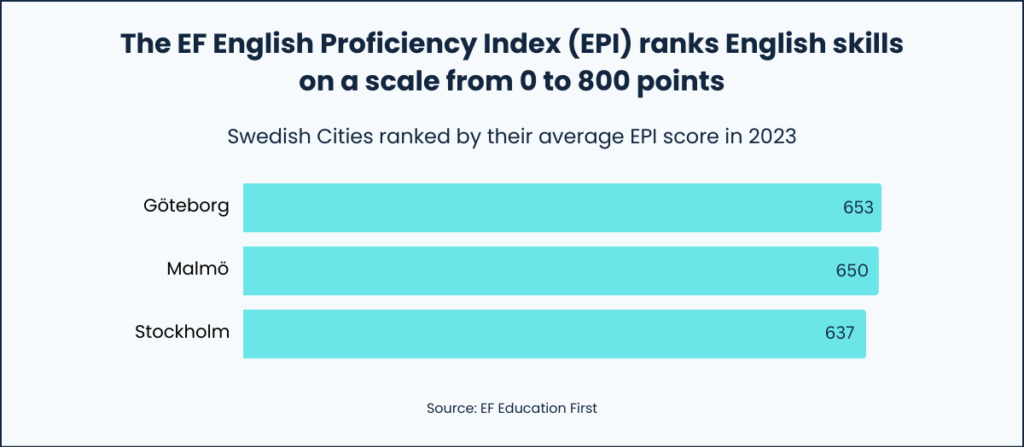
The cities with the best English are likely also the ones with the largest population of English speakers:
- Stockholm
- Göteborg
- Malmö
On the opposite end, the cities with the lowest proficiency scores in 2023 are likely located in Småland and the islands, as this region has the lowest average EPI score:
- Jönköping
- Kalmar
- Växjö
- Visby
The EF website offers 2023 data on Sweden’s top three cities. Here’s how they compare:
| City | EPI Score | Proficiency Level |
| Stockholm | 637 | Very High |
| Göteborg | 653 | Very High |
| Malmö | 650 | Very High |
There’s a slight score difference between the cities but overall, people in Stockholm, Göteborg, and Malmö speak English with very high fluency and accuracy.
The 2023 edition of the EF-EPI doesn’t provide data on any other cities. But when we look at the average numbers by region, test takers in Jönköping, Kalmar, Växjö, and Visby likely had scores under 600 on average, the equivalent of an upper-intermediate level in English.
Other cities with very high English proficiency are likely to be Göteborg, Umeå, Falun, and Karlstad. English speakers in these cities likely have an average EPI score of over 600.
Sources: Statistikmyndigheten SCB, Education First
English Speakers in Sweden by Age Group
There aren’t large demographic differences in the number or level of English speakers in Sweden. However, younger Swedes are more likely to speak English, with people aged 26-30 having the best spoken English on average.

Here’s what we know, according to 2023 English Proficiency Index data:
- Both men and women speak fluent English, with average scores of 630 and 589, respectively.
- Most Swedes aged 21-41+ had very high English proficiency on average.
- People with the best English scores fell within the age bracket of 26-30.
- People under 20 had slightly lower proficiency, falling right between a B2 and a C1 level on the CEFR scale.
- Swedish children start English classes as early as age 6-7, and most reach a high level of fluency by the end of high school.
- Even Swedes aged 60-70 years old are likely to speak some English.
The EF website only offers data on people aged 18-41+, so we don’t know much about people under 18, or different age cutoffs over 41.
However, people under 18 likely have a B1-B2 English level, which makes them independent speakers of the language. This means that young English speakers can easily hold a conversation and make themselves understood in a wide range of everyday scenarios.
In most countries in the world, the older population is less likely to speak English as a second language. The same may be true for Sweden, where people over 70 are less likely to speak English.
According to Dr. Béatrice Cabau, Associate Professor at the Hong Kong Baptist University, English became a compulsory subject in all Swedish schools in the mid-20th century. Therefore, older Swedish adults aged 50-70 likely have some degree of English knowledge.
Sources: Education First, Semantic Scholar
Conclusion
Much of the Swedish population speaks more than one language and almost 90% of Swedes speak English. According to the English Proficiency Index, most people in Sweden speak fluent English.
Irrespective of region, city, or age, many Swedes can understand, write, and speak English with ease and accuracy, being able to hold a seamless conversation on the level of native English speakers.
Whether we’re talking simple chitchat or complex and nuanced topics, Swedish people don’t have to worry about language barriers in the workplace or everyday life when speaking English.
FAQs
1. Can you get by in Sweden if you don’t speak Swedish?
Learning the official language brings more social and job opportunities. If you move to Sweden, you’ll find it easier to make friends, and you’ll get a better appreciation for the culture if you learn Swedish.
But tourists, exchange students, and short-term relocations, people can still manage without speaking Swedish. While not all people in Sweden speak English, most people do. It’s easy to find help, and many of the street signs in the big cities are bilingual.
2. How many languages do Swedish people speak?
Sweden’s official language is Swedish. That being said, Sweden has multiple other recognized languages, including Sámi languages, Finnish, Yiddish, Meänkieli, and other minority languages and regional dialects.
On top of that, the school curriculum mandates that all Swedish students learn two foreign languages. It’s common for many Swedes to speak a second and sometimes a third language. Roughly 30% of Swedes speak German and 11% speak French as a foreign language.
3. Is English widely spoken in Sweden?
Yes! According to a recent Eurobarometer report, almost 40% of Swedish responders said they used English almost every day, and 20% said they used English often but not daily.
English is especially widespread in the workplace, with many large corporations listing English as a requirement for job applicants.